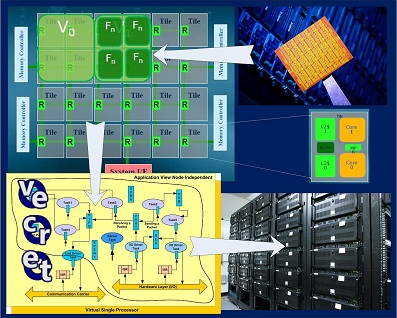You are hereAnnouncement - Altreonic porting to Intel Labs 48core SCC chip
Announcement - Altreonic porting to Intel Labs 48core SCC chip

Altreonic has signed an agreement with Intel Labs to port its multicore capable OpenComRTOS to the Single-chip Cloud Computer (SCC) experimental processor, a 48-core ‘concept vehicle’ created by Intel Labs as a platform for many-core software research. It incorporates technologies intended to scale multi-core processors to 100 cores and beyond, such as an on-chip network, advanced power management technologies and support for “message-passing.”
Programming parallel systems with many processor cores has been at the core of Altreonic’s technology for many years and hence it was natural for Altreonic to join in the effort as it already has proven technology.
While the hardware scaling seems to have no limits thanks to Moore’s law (and Intel is well placed through its access to the most advanced and dense silicon technology), programming modern manycore and multicore systems is still perceived as a serious challenge and software productivity has been lagging far behind the progress made on the hardware side. Therefore Intel Labs has created the Many-core Applications Research Community (MARC) and invited academics and industry to join the effort making serious progress in this direction.
OpenComRTOS is the only formally developed network-centric RTOS in the market today. Its architecture is not only very scalable and safe, but also very performant while reducing power consumption. Compared with a previously manually developed and similar RTOS, it is ten times smaller, requiring only 5 KiBytes per node. Additionally, OpenComRTOS supports distributed target architectures and heterogeneous processors, making it ideal for distributed industrial automation, robotics, manycore SoC, parallel processing and many more applications. Its current implementation could theoretically handle 64 thousand processing nodes. The OpenVE Visual modeling environment, integrated code generators and visual profiling tool further reduce the programming effort, so that the software developer can focus on his application.
What makes OpenComRTOS very interesting for the SCC processor is that it allows a seamless integration between front-end host nodes (e.g. running Linux or Windows) and dedicated processing nodes. OpenComRTOS turns the 48 cores in a single virtual processor removing the complexity barriers of multicore programming. In addition, its small code size fits comfortable in the L1 level cache so that maximum performance can be reached for the OS as well as for the application as it reduces considerably the latency from accessing external memory.
In the project Altreonic will port OpenComRTOS and intends to develop extensions that take into account the specific features of the SCC chip. These extensions are in the domain of high speed parallel processing, dynamic resource management and adaptive power control.
Being formally developed with availability of full development documentation, formal models and source code, makes OpenComRTOS the logical choice for enabling fast certification with todays' industry standards. Altreonic’s innovative open licensing scheme provides its customers minimum development risks and high levels of flexibility in their development projects.
For more information, contact:
Eric Verhulst, CEO/CTO
Contact:
eric.verhulst (@) Altreonic.com
Tel.: +32 477 608 339
For more information on the SCC visit:
- Printer-friendly version
- Login to post comments